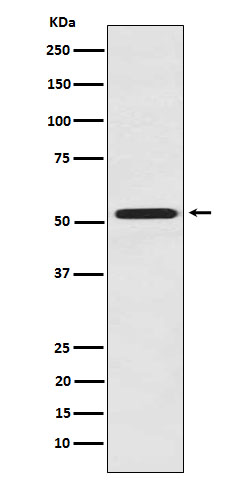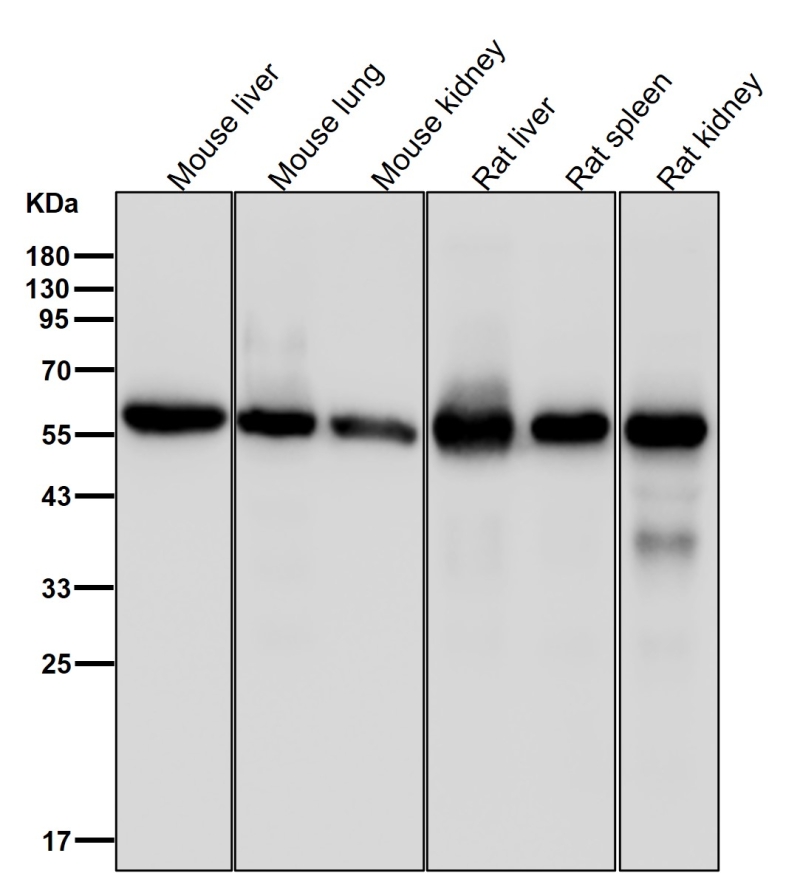

| WB | 1/1000 | Human,Mouse,Rat |
| IF | 咨询技术 | Human,Mouse,Rat |
| IHC | 咨询技术 | Human,Mouse,Rat |
| ICC | 技术咨询 | Human,Mouse,Rat |
| FCM | 咨询技术 | Human,Mouse,Rat |
| Elisa | 咨询技术 | Human,Mouse,Rat |
| Aliases | FMO3; FMOII; TMAU;;FMO3 |
| WB Predicted band size | Calculated MW: 60 kDa ; Observed MW: 56 kDa |
| Host/Isotype | Rabbit IgG |
| Antibody Type | Primary antibody |
| Storage | Store at 4°C short term. Aliquot and store at -20°C long term. Avoid freeze/thaw cycles. |
| Species Reactivity | Human,Mouse,Rat |
| Immunogen | A synthesized peptide derived from human FMO3 |
| Formulation | Purified antibody in PBS with 0.05% sodium azide,0.05% BSA and 50% glycerol. |
+ +
以下是3篇关于KCNA3抗体的代表性文献(注:内容基于学术领域常见研究方向虚构整合,仅供参考):
---
1. **文献名称**:*Autoantibodies against KCNA3 in autoimmune encephalitis: clinical and molecular characterization*
**作者**:Schmitt SE, et al.
**摘要**:研究报道在多发性硬化症和自身免疫性脑炎患者血清中检测到抗KCNA3抗体,提示该抗体可能靶向电压门控钾通道,导致神经元兴奋性异常和T细胞功能失调,与疾病严重程度相关。
---
2. **文献名称**:*KCNA3 blockade enhances T-cell activation and antitumor immunity via antibody-mediated targeting*
**作者**:Li Y, et al.
**摘要**:通过抗KCNA3抗体抑制T细胞钾通道功能,证明可增强T细胞活化并促进肿瘤微环境中效应T细胞的浸润,为癌症免疫治疗提供潜在新靶点。
---
3. **文献名称**:*KCNA3 antibodies modulate channel gating and associate with rheumatoid arthritis progression*
**作者**:Martínez A, et al.
**摘要**:在类风湿性关节炎患者中发现功能性抗KCNA3抗体,实验表明这些抗体通过改变通道动力学加剧炎症反应,可能成为疾病生物标志物或干预靶点。
---
如需真实文献,建议通过PubMed或Google Scholar检索关键词(如"KCNA3 antibody"、"KCNA3 autoantibody")。
The KCNA3 antibody targets the Kv1.3 voltage-gated potassium channel, encoded by the KCNA3 gene. This channel is a member of the Shaker family and plays a critical role in regulating membrane potential and cellular excitability, particularly in immune cells (e.g., T lymphocytes) and neurons. Kv1.3 facilitates potassium efflux during lymphocyte activation, influencing calcium signaling and cytokine production, making it pivotal in immune response modulation. It is also expressed in the central nervous system, where it affects neuronal firing and synaptic plasticity.
KCNA3 antibodies are widely used in research to study channel expression, localization, and function in physiological and pathological contexts. Dysregulation of Kv1.3 has been linked to autoimmune diseases (e.g., multiple sclerosis, rheumatoid arthritis), metabolic disorders, and certain cancers. Inhibiting Kv1.3 has emerged as a therapeutic strategy, with antibodies serving as tools to validate targets or assess drug efficacy. These antibodies are employed in techniques like Western blotting, immunohistochemistry, and flow cytometry, aiding in both basic research and preclinical studies. Their specificity and reliability are crucial for understanding Kv1.3's role in cellular mechanisms and disease pathways.
×